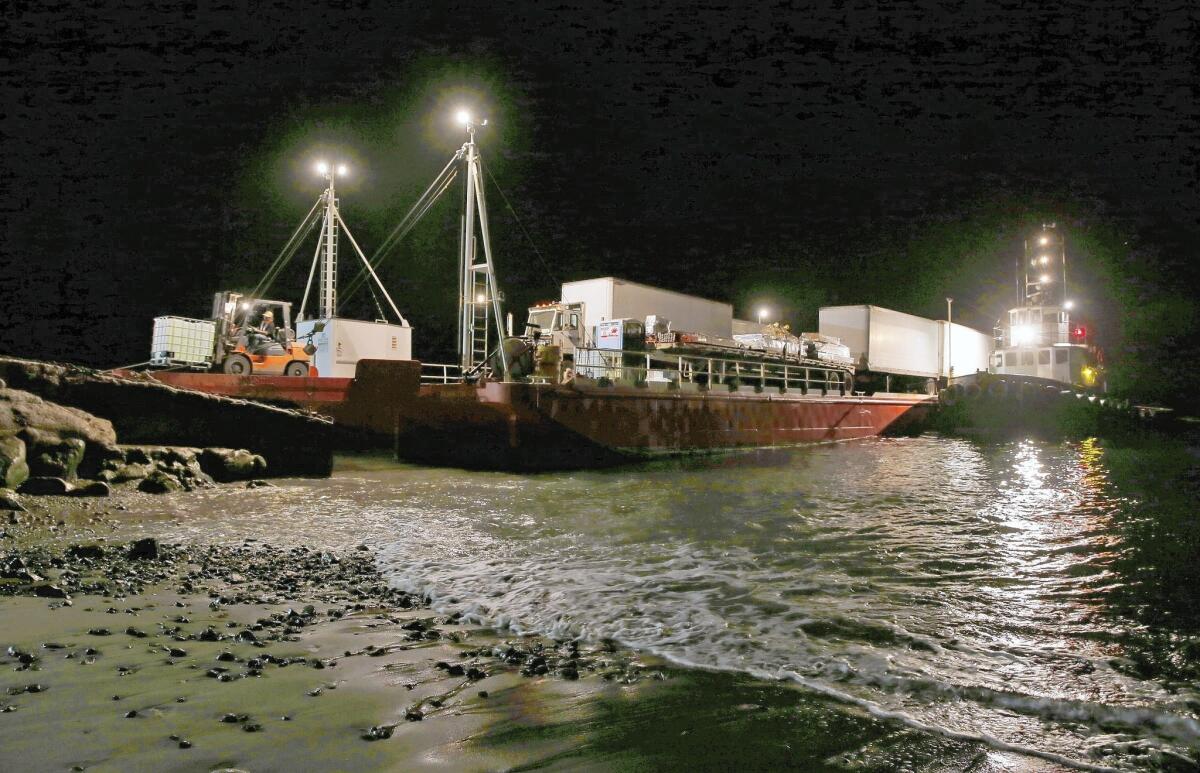Three firms competing for control of Catalina’s freight

Business owners and residents on Catalina pay a premium for goods from the mainland. Above, a container of water is offloaded from a barge.
- Share via
For more than a year, a crucial question has gone unanswered on Santa Catalina Island: Who will control the freight service that brings bottled water, groceries and other essentials from the mainland, 26 miles away?
Three companies are vying for the business — a vital necessity for residents and tourists — causing a heated legal and regulatory battle that has consumed the island. After months of public hearings and political maneuvering, the California Public Utilities Commission will decide next month whether to grant operating licenses to one or more of the companies.
A PUC judge and commissioner issued two separate proposals last week, which the five-member commission will consider at its Feb. 25 meeting. One proposal would deny access to Avalon Freight Services, a newly formed freight carrier handpicked by Santa Catalina Island Co., the island’s largest landowner, which also owns the dock space. The other would grant licenses to that company and two competitors.
See more of our top stories on Facebook >>
Both proposals raised concerns about the business relationship and profit-sharing arrangement between Avalon Freight Services and Santa Catalina Island Co. Who controls the pipeline of goods flowing on and off the island is one of the most crucial issues in Catalina, where business owners and residents already pay a premium for goods including gas and toilet paper.
“It’s a lot of money coming out of my pocket,” Steve Bray, who runs a steakhouse along the waterfront in Avalon, said during a public hearing last summer. “None of these other restaurants on the mainland have to pay this.”
Concern over the cost of freight has intensified over the last two years, after Santa Catalina Island Co. chose to hand the sole freight delivery contract to Avalon Freight Services, which is controlled in part by Greg Bombard, the president of Catalina Express, the island’s primary passenger service. It is also the only freight carrier that has been granted dock access.
Santa Catalina Island Co. owns the dock site where the vast majority of goods come ashore on Catalina. There are virtually no other potential landing spots near populated sections of the island.
Two of the seven losing bidders for the contract, Curtin Maritime and the incumbent, Catalina Freight Line, protested to state authorities that multiple freight companies should be allowed to compete to help keep prices low.
Avalon Freight Services argued that multiple carriers operating at a small dock would create safety concerns.
One major question throughout the dispute has been whether Santa Catalina Island Co. — a private party — can dictate the terms of a public utility such as freight. Randall Herrel, the company’s presidentdeclined to comment.
Darwin Farrar, the PUC judge who has been researching the issue since early last year, raised similar concerns in his decision last week. Allowing a “financially interested private party” such as the Island Co. to choose the new operator would be “an inappropriate delegation of commission authority,” he wrote.
He also questioned the structure of Avalon Freight Services, which involves leasing arrangements for vessels and warehouse space with other related companies, including the Catalina Express passenger line. Farrar said the overlapping business interests would make it possible for Avalon Freight Services to “game the commission’s rate review process.”
The alternate proposal before the commission, written by Commissioner Liane Randolph, raised the same questions but would allow Avalon Freight Services to operate if it disclosed all related financial transactions.
“We have no problem at all showing anything they want to see,” said Bombard, the president of Catalina Express and Avalon Freight Services. “We’ve got nothing to hide here.”
The first proposal would deny a license to Avalon Freight Services and grant one to Curtin Maritime, whose owner proposed rates that could go up or down based on competition. The current freight provider, Catalina Freight Line, would need to reapply for a license. The alternate proposal would allow all three companies to operate.
Martin Curtin, chief executive of Curtin Maritime, said he was pleased that both proposals granted a license to his company. But he is still concerned about the revenue-sharing arrangement between Avalon Freight Services and the Island Co., which he believes could give that operator an unfair advantage.
“It doesn’t create open competition if a company like the Island Co. is fiscal partners with Avalon Freight,” he said.
Rich Coffey, chief executive of Catalina Freight Line, the island’s current operator, said any decision is an improvement over his current situation – going out of business in April once his contract ends.
“I want to work with the Island Co., and I’m happy to compete for my customers’ business,” he said. “But let’s do what’s right for community, and if we can make that happen then everybody should be good.”
ALSO
Kerber upsets Serena Williams to win Australian Open title
ESL teacher may have played a ‘significant role’ in helping 3 O.C. inmates escape
Waiting for rain? Here’s what’s keeping the brunt of El Niño away
More to Read
Inside the business of entertainment
The Wide Shot brings you news, analysis and insights on everything from streaming wars to production — and what it all means for the future.
You may occasionally receive promotional content from the Los Angeles Times.











